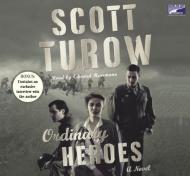
by Edward Herrmann (Narrator) Scott Turow (Author)
Audio CD- N/A
A fiction, it a story about young people in modern society.
Overall rating:
How would you rate this book?
Member ratings
As historic fiction about World War II, the story succeeds. The battles were real and the descriptions authentic. They put the reader in the midst of the danger and the carnage. The arrogance of the commanding officers is exposed as are the petty prejudices of the soldiers as well as their fear of combat and death.
Some of the information is based on facts and can be documented; some is made up out of whole cloth. There was a race to build a weapon that could split the atom and cause a level of destruction no could ever imagine. There were concentration camps committing crimes against humanity, and atrocities beyond belief were conducted there. There were resistance fighters, spies, a working underground army in France, and an intelligence agency called the O.S.S, the precursor to the CIA. There were insubordinate soldiers, traitors and deserters. There was no Gita Lodz or Robert Martin.
After the death of his father, David Dubin, Stuart Dubinsky, a retired journalist and frustrated author, discovers information about him that he had never known. Their relationship had not been as close as it should have been, and it was now too late to reconcile any differences. All he knew for sure was that his father had met his mother when she was in a concentration camp. It was at the end of the war, and they married in 1946. Everything that happened to them before that was in the past, left in silence, everything else was the future that they lived.
Reading through the letters of his father from a previously unknown former girlfriend, Grace Morton, he discovers that his father had another life he never knew about. He had been engaged before he married his mother, he had been court-martialed at the war’s end and sentenced to prison, but the sentence was eventually overturned. He had no idea about the court-martial or its dismissal. He was astonished and upon learning the name of the lawyer who defended his father, he sets out to find him. He had little hope since so much time had passed, but when he found him in an assisted living facility, deep into his 90’s, he was surprised to find a weakened frail man with a mind sharp as a tack and a memory like a steel trap. However, the lawyer refused to tell him the whole story, because of attorney client privilege.
Against the wishes of his mother and his siblings, he doggedly decides to try to ferret out the secrets his father had so desperately sought to prevent his family from discovering and to write a book about the events. Through a manuscript written by his father, interviews with the lawyer and letters, he slowly finds out more about his father’s time in the service. As a lawyer, he was a member of the judicial branch of the army. He had been both a JAG officer and an infantry soldier. The General he was assigned to, ordered him to investigate a Robert Martin, accused of insubordination, impersonating an O.S.S officer, disobeying orders and eventually of being a Soviet spy. Through Martin, he met Gita Lodz, a resistance fighter; both are fictional characters. There are other names, however, in the story which will be recognized as famous generals and scientists.
Will Stuart write David’s story and expose his father’s hidden background, perhaps bringing unnecessary shame upon his family, or will he let sleeping dogs lie? In a sense this book is not only a soldier’s story, it is also a condemnation of war, of the military command, the command that sent innocent men to die with abandon, that sent them on suicide missions while they sat in relative safety, the command that put them in situations that were often untenable, making them do things they would not do normally. The racism and anti-Semitism and the homophobia of those times, during WWII is authentic, but some of the military orders seemed to simply be the product of demented minds, arrogant leaders, bent on vengeance or petty quarrels they wanted to settle simply because they could.
The mystery unravels a bit too slowly for my taste. The details of the underlying spy story, although exciting, stretched the imagination as did the love story between two unlikely characters. Some of the dialogue is silly and inappropriate, not the language, because foul language is a product of men and war, but the conversations at times, bordered on the insensitive and ridiculous. Otherwise it was an accurate picture of war, the fear, the fighting, the bloodshed and the brutality. Happily, also, the reader of this audiobook did an outstanding job. His voice did not drone, was well modulated, and held my interest at all times.
Book Club HQ to over 90,000+ book clubs and ready to welcome yours.
Get free weekly updates on top club picks, book giveaways, author events and more








